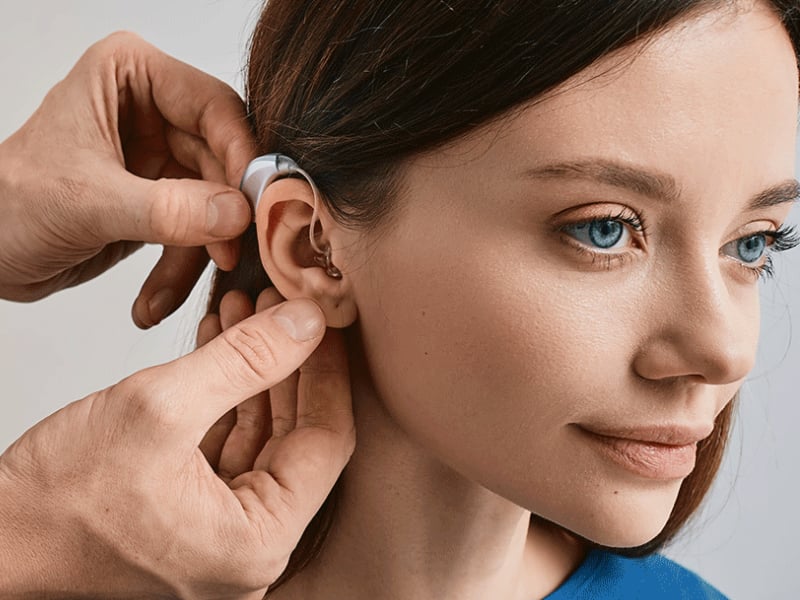Audiology/Hearing Specialists
An audiologist is a professional who evaluates and treats individuals with hearing loss and/or vestibular (balance) problems. They use a variety of special tests to identify if there is a hearing or balance problem that may be related to parts of the ear. Audiologists use this information to identify the type, degree and location of the problem in the auditory (hearing) or vestibular (balance) system. Audiologists are specially trained in helping people with hearing loss using a therapeutic approach through hearing devices.
If we determine that you may benefit from hearing aids, we will let you know about options that are right for you. We may refer you to an ear, nose and throat physician (if you haven’t already seen one) before you start your hearing aid journey.
MetroHealth audiologists have earned master's or doctorate degrees from accredited university graduate programs. They are certified by the American Speech-Language-Hearing Association and are licensed by the state of Ohio. Many MetroHealth audiologists are fellows of the American Academy of Audiology. All MetroHealth audiologists participate in resident education and supervise doctoral students from university programs. The MetroHealth Audiology Department is a division of the Department of Otolaryngology. It provides full-service diagnostic and rehabilitative services, including a complete hearing aid dispensary with state-of-the-art digital processing technology.
Signs of Hearing Loss
Hearing loss can affect any age or population. Unidentified hearing loss in adults can significantly affect quality of life at work, home and in social situations. Speech and language development will be impaired in children with significant hearing loss that is not identified before age 3.
Even though these issues are serious, it's not always the person with hearing loss who notices the problem. Friends and family will often notice it first.
Understanding Hearing Loss
According to the National Institute on Deafness and Other Communication Disorders, approximately 17 percent (36 million) of American adults report some degree of hearing loss. About 3 out of every 1,000 children in the United States are born deaf or hard of hearing.
Signs of hearing loss include:
- Difficulty in understanding speech, especially when there is background noise or when a person is not looking at the speaker. A person may be able to "hear" but not "understand."
- Behavior problems or trouble speaking words to communicate, if the person with hearing loss is a child.
- Difficulty engaging in conversations, especially in groups.
- Avoiding difficult listening environments, such as eating out or going to events with a lot of people or noise.
- Difficulty locating the source of a sound.
- Louder than normal volume on televisions or telephones.
- A sense that people are mumbling.
There are three main types of hearing loss:
- Sensorineural hearing loss is usually permanent and can happen at any time during a person's life. Aging, certain medical conditions, vascular disease, exposure to loud noise, head trauma or a virus can be some reasons for sensorineural hearing loss.
- Conductive hearing loss affects how sound moves through the outer or middle ear. It can be caused by wax in the ear canal, fluid in the middle ear or deformation of the bones in the middle ear. Many times, this can be medically treated.
- Mixed hearing loss occurs when both conductive and sensorineural hearing loss are present. Sometimes only part of this type of hearing loss can be treated.
If you or a loved one is having difficulty hearing, call 216-778-4391 to schedule an appointment.
Hearing Evaluations
There are many ways to evaluate a person's hearing. MetroHealth audiologists are skilled at testing all populations, including those with special needs. Contact your physician or pediatrician with your hearing concerns and ask for a referral to the Department of Audiology.
Your doctor may send you to an otolaryngologist (ear, nose and throat physician) or audiologist (hearing and balance professional) for special hearing tests and evaluations. You may have a problem that is easily treated, or you may need hearing aids.
To schedule an appointment, call 216-778-4391.
What to Expect
Audiologists use a graph called an audiogram to demonstrate how well a person can detect sounds. Audiograms help predict how hearing sensitivity affects activities of daily living.
Two important aspects of hearing are detecting sounds and understanding speech. Audiologists determine the softest volume level of a sound that can be detected by the individual. These sounds are similar to music and are in the same pitch range as speech. Spoken words are a combination of these sounds, and if a person cannot hear all the sounds at normal hearing levels, they have hearing loss at all or part of the speech range. Speech will often sound muffled or unclear to a person with hearing loss.
We'll explain what those results mean, and we will answer any questions you may have. You may have a hearing loss that can be treated by a physician. If not, we will review options that are available to you, including hearing aids.
Hearing Aids
Hearing evaluations are normally covered by insurance. If you decide to get hearing aids, a separate appointment is scheduled to discuss your options.
Some health plans at least partially cover the cost of hearing aids. Your health insurance dictates how much – if anything – your out-of-pocket costs are. Resources are available for those without insurance or with financial hardships.
MetroHealth's Hearing Aid Program provides the following services:
- custom fitting
- education and tips on use
- additional visits included
- repair and warranty for 3 years, batteries included
- return within 30 days after purchase for any reason
If you have questions or would like to schedule an appointment, call 216-778-4391.
